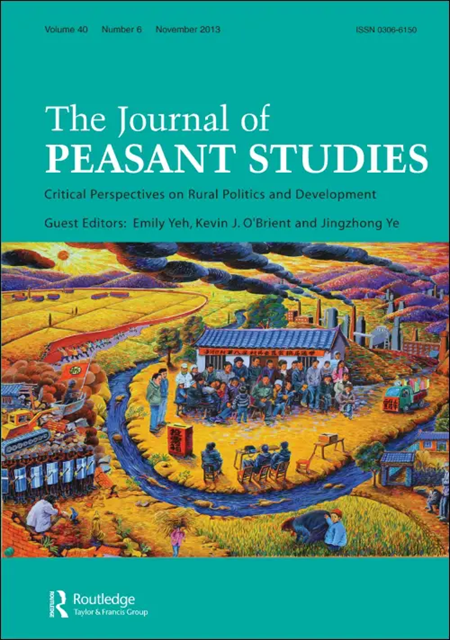Reclaiming the worker's property: control grabbing, farmworkers and the Las Tunas Accords in Nicaragua
IF 4.8
1区 社会学
Q1 ANTHROPOLOGY
引用次数: 11
Abstract
In this paper I explore a land grabbing resistance movement composed of unemployed coffee workers in Central Nicaragua. Between 1996 and 2000, a private agro-export conglomerate appropriated worker-owned coffee estates previously designated as the Area Propiedad del Los Trabajadores (APT), or the Worker's Property. Following mass protests between 2001 and 2004, worker representatives from the Asociación de Trabajadores del Campo (ATC) and government officials negotiated and signed the Las Tunas Accords which provided redistributed land from 18 of those coffee estates to 2500 families. Drawing on interviews with movement participants carried out between 2003 and 2012, I argue that the roots of the control grab and the resistance movement can be traced to the contradictions of the Sandinista National Liberation Front (FSLN)-led agrarian reform in the 1980s, the conflicts over property in the post-war period and the failed consensus on how rural labor should organize and be represented in the face of land re-concentration and capitalist consolidation.收回工人的财产:控制掠夺,农场工人和尼加拉瓜的拉斯图纳斯协议
本文探讨了尼加拉瓜中部由失业咖啡工人组成的土地掠夺抵抗运动。1996年至2000年间,一家私营农产品出口集团侵占了工人拥有的咖啡庄园,这些庄园以前被指定为“工人财产”(APT)。在2001年至2004年的大规模抗议活动之后,Asociación de Trabajadores del Campo (ATC)的工人代表与政府官员谈判并签署了《拉斯图纳斯协议》,将其中18个咖啡庄园的土地重新分配给2500个家庭。根据2003年至2012年期间对运动参与者的采访,我认为,夺取控制权和抵抗运动的根源可以追溯到20世纪80年代桑地诺民族解放阵线(FSLN)领导的土地改革的矛盾,战后时期关于财产的冲突,以及面对土地重新集中和资本主义巩固,农村劳动力应该如何组织和代表的失败共识。
本文章由计算机程序翻译,如有差异,请以英文原文为准。
求助全文
约1分钟内获得全文
求助全文
来源期刊

Journal of Peasant Studies
Multiple-
CiteScore
10.50
自引率
17.60%
发文量
99
期刊介绍:
A leading journal in the field of rural politics and development, The Journal of Peasant Studies (JPS) provokes and promotes critical thinking about social structures, institutions, actors and processes of change in and in relation to the rural world. It fosters inquiry into how agrarian power relations between classes and other social groups are created, understood, contested and transformed. JPS pays special attention to questions of ‘agency’ of marginalized groups in agrarian societies, particularly their autonomy and capacity to interpret – and change – their conditions.
 求助内容:
求助内容: 应助结果提醒方式:
应助结果提醒方式:


